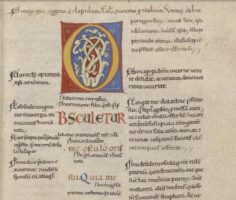Song of Songs
The commentary un-tradition
Issue 09 — Spring 2022 — Session 06 —
By Jesús R. Velasco | Published on January 21, 2022
At the beginning of love poetry, there is the "Shir ha-Shirin", the Song of Songs, or, maybe a better translation, "The Most Beautiful Poem". The only poem, indeed. At the center of the poetic books of the Bible, along with the Psalms and Jeremiah's "Lamentations", the Song of Songs posits specific problems to its readers across the ages: there is simply too much flesh, too much eroticism, and too much love that the law may find misguided. And yet, there it is, next to the law, doing things with the law, with poetry, with language, with history. What?
Documents
- Biblia de Arragel, "Commentary of the Song of Songs"
- Glossa Ordinaria Song of Songs
- Dove, "Glosa Ordinaria on the Song of Songs"
- Bernard of Clairvaux, "Sermon on the Song of Songs"
Keywords
Share
On the margins of this article, there are pdf’s to two commentaries of the Song of Songs, that of the Spanish rabbi Arragel, who translated, commented, and painted a Bible for the Duke of Alba in the early 15th century, and an edition of the Bible with the Ordinary Gloss and the commentaries of Nicholas of Lyra. The latter is in Latin. Also, too have the English translation of the Glossa Ordinaria: Mary Dove, The Glossa Ordinaria on the Song of Songs, Medieval Institute Publications, 2004. Although we will consider the other ones and maybe more commentaries that I will add to the margins, we will focus on Dove’s translation.


